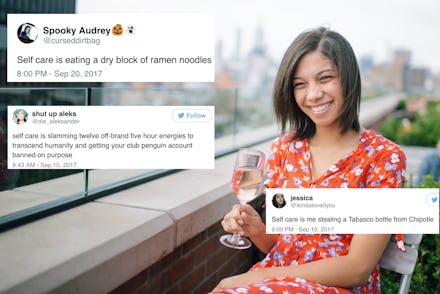Self-care memes are pushing the #SelfCare movement to its absurd, nihilistic limits

As our political world becomes increasingly absurd, so too has the internet’s feverish search for “self-care.”
This term, which recently has come to stand for any kind of seemingly indulgent, me-first activity — like meditating, buying a face mask or going to a fancy restaurant by yourself — picked up steam in the wake of Donald Trump’s election as a part of an earnest attempt to facilitate positive mental health and well-being.
But now, as the absurdism of our political climate shows no signs of slowing down — late night host Jimmy Kimmel having more knowledge of the Graham-Cassidy health care legislation than Republican senators, for example — the internet’s coping mechanisms are increasing in absurdity at an equal rate, flooding social media in a wash of memes that push the meaning of “self-care” to its ridiculous, hilarious limits.
For example:
Like the rise of suicide memes, these self-care memes likely exist because of the internet’s tendency to turn toward absolute nihilism as a means of venting frustration — with their personal relationships, the news, whatever. It’s unlikely these people are actually sobbing at 1 a.m. with a mouthful of beef jerky or committing crimes in a Chipotle to feel better about themselves, but their heightened, unshackled internet personas are free to deal with personal trauma however they want.
But it’s not as though this meme arose out of pure frustration with our political process — it’s also a cynical response to the increasingly indulgent, commodified trend of self-care in general.
Originally, the idea of self-care was a sort of political act of self-affirmation in the hands of people of color and queer people, as a way to defy those in power who would otherwise deny you of your own identity.
“Caring for myself is not self-indulgence, it is self-preservation, and that is an act of political warfare,” written by Audre Lorde, became a “rallying cry” in the late 1980s for this kind of radical insistence of one’s own importance, according to Jordan Kisner for the New Yorker.
Kisner identifies late 2016, in the wake of Trump’s election, as another wave of this self-care movement — one that took a decidedly more insidious, capitalistic form. Self-care became an Instagram branding tactic, a way for companies to help people justify rampant consumerism.
“A survey of one recent morning’s [#SelfCare-tagged] Instagram and Pinterest posts turned up an image by West Elm showing a kitten napping on one of the company’s quilts, an ad for Schick Hydro Silk razors and a link to an article on five-minute ‘self-care moves’ sponsored by eBay,” Kisner wrote, “with hyperlinks to essential oils and books of Mary Oliver poetry available for purchase.”
And now, with the rise of these more nihilistic self-care memes, it seems we might be entering yet another wave in the ever-evolving self-care movement, where we don’t need Target or Sephora or whoever to tell us that buying nail polish is a radical act.
If self-care has originated in establishing one’s own identity in defiance of those in power, then maybe dragging the whole #SelfCare movement is, in a way, a return to those origins. By pushing self-care to its absurdist limits, we deny a multimillion-dollar corporation the power to tell us how to love ourselves — and instead, just sit sobbing in front of our computers watching Hamilton videos. But hey, at least it’s on our terms.